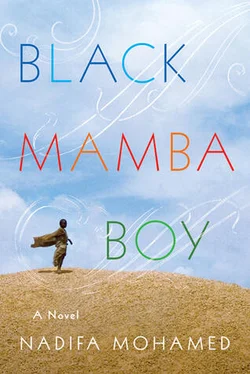“You will be married with children and grandchildren but you will also ride the waves of all the seas.”
Rain came down in broad sheets and battered at the door, cold air blew into the tukul and ripped at Guure.
“Father, why did you leave me and hooyo?”
“I thought my life would be long. I expected so much from it and wanted to come back when I could lay it at your feet, but I was merely a puppet with fine strings suspending me.”
Jama stared into his father’s eyes.
“But from the stars I watch you, your mother watches you, we have been beside you during every trial.”
Another gust of wind threw open the door. “My time is up,” gasped Guure as his spectral body was torn apart and the lamps of his eyes extinguished, leaving Jama in darkness once again.
The tukul was overwhelmed by the scent of frankincense in the morning, and the coal in the white urn was still red hot. Jama put his few possessions over the fire until everything was full of his father’s smell. He had no English, no idea how to get to Egypt, but this was not enough to stop him, he finally knew what to do with the small fortune his mother had tied around his neck. He tracked Bethlehem down, where she sat on a rock halfheartedly watching the goats. She gave Jama an evil look as he approached. “What do you want?”
“I want to tell you something.”
“Well, keep it to yourself, I’m not interested in you anymore,” she lied.
Jama sat down next to her but she moved away. “I have been given a message by my father. I’m going to find work like you want me to”—Bethlehem’s eyes lit up—“but it will mean that I have to go to Egypt and spend some time away.”
Bethlehem looked at him as if he had lost his mind. “What? What foolishness has come over you?” Bethlehem had no idea where Egypt was, but she knew it was far from home.
“I’m going to join the British ships and get rich and come home to you,” Jama cajoled.
“Home, home, you won’t come home! You will be killed, the hyenas will eat you, you madman!” she hollered.
“Calm down, Bethlehem, one minute you tell me to find work, and now this.”
“I want you to get a real job, near here, not disappear to another world because you have been speaking to ghosts! You don’t even know where you’re going,” she cried. Jama wasn’t sure if she was worried for him or was simply angry that he was doing something she hadn’t prescribed.
“I could come back a rich man, richer than anyone here, twice as rich as your father. He wouldn’t care that I was a foreigner then, would he?”
Bethlehem’s face was wet with tears.
“Why are you getting so crazy, Bethlehem? In the name of God, I’m only trying to do the right thing,” Jama said, exasperated.
“No, you’re not! You want to run away! Just like my mother said you would,” she shouted back. “You have made a fool of me,” she sobbed.
“If you want to make every decision for me, what’s the point of my being alive? You might as well live both of our lives for us. I’m going now, Bethlehem, you will see what I do. Judge me by my actions, that’s all I ask. I will come later to say goodbye.” Jama went to kiss her cheek. Bethlehem shook her head violently and pushed him away.
Jama dragged his dusty feet to Hakim’s store, where Awate waited gleefully for another day with the bad boys, but he was to be disappointed. Jama picked him up. “You know, Awate, when I came to Eritrea I was the same size as you, I was a skinny, desperate little thing. I was never sent to school like you, and I learned everything the hard way. While I am away I want you to finish this school, pick every last bit of knowledge out of that teacher’s brain, and then go to Kassala. When I come back you will write my letters and read books to me. I will promote you from number one coolie to number one ma’alim.” Jama kissed Awate on both cheeks and set him on the ground. Awate stifled his tears and turned in the direction of his tukul, dragging his schoolbag along the dirt.
Jama whistled at him. “Awate, pick up your bag. A ma’alim cannot misbehave in front of his pupil.” Awate held it to his chest and gave Jama a sullen smile.
Jama heard a knock on his tukul and found Bethlehem, her mother, and her many sisters waiting outside for him. Bethlehem had dressed up for the occasion, in bright clothes, beads in her hair, silver jewelry hanging from her neck, ears, and wrists, but her face was angry and red-eyed.
“Greetings,” Jama said hesitantly.
“Greetings,” the women replied sourly.
“Little Somali, you have made Bethlehem even crazier than she was. She won’t stop crying, she tells me you promised to marry her but are now going back to your own country because a ghost has told you to! She will not eat, work, or talk. What can I do with a child like this?” spat Bethlehem’s mother, wagging her finger in his face.
“I’m not going back to my country, I am going to Egypt so that I can return with enough money to pay for her dowry. I’m leaving tomorrow morning,” said Jama, humiliated and unable to look at Bethlehem.
“Forget the dowry, a sane child will be enough. Marry her now, before you leave, it’s the only thing that will bring my child back to her senses.”
Bethlehem wiped her nose and eyes, looked pleadingly at Jama.
“I’ll marry you, Bethlehem, you are all I have in this world,” Jama said, his heart racing.
The marriage was performed by a group of red-robed old women who had some knowledge of the Qu’ran, but everything felt rushed, ramshackle. A goat was dragged over from Bethlehem’s yard and slaughtered to feed the well-wishing gossips trickling in from the fields. Jama and Bethlehem huddled together in awe of what they had just done. The scorn, anger, and misery had been wiped from Bethlehem’s face and Jama could see her beauty in full luminosity again. She was the most beautiful girl he had ever seen. He surreptitiously held her hand, unable to believe they would now be treated like grown-ups, able to do what they liked together.
Jama laughed.
Bethlehem smiled. “What’s so funny?”
“I can’t believe you’ve done this.”
“You can’t mess a Kunama girl around, little Somali. Let this be a lesson to you,” Bethlehem said, squeezing his hand.
When the women had eaten, they began clapping and singing, and Bethlehem taught Jama the dances, flinging her beaded hair from side to side.
“Wah! Wah! Dance, little Somali!” the women exclaimed, surprised that a foreigner could dance so well.
Jama lost himself to the rhythm, Bethlehem’s flushed face right next to his, her breath all over him. He danced with his girl until the hyenas started howling.
A procession of sisters, cousins, and aunts led Bethlehem to Jama’s tukul. She would live there until he came back, her own woman. Bethlehem had brought a bundle from her home, and as soon as her crying relatives had left, she unpacked and began to redecorate Jama’s dusty room. She made the tukul beautiful, with bright embroidered cloths covering the floor, straw baskets on the walls, and amber and silver necklaces hanging from a hook next to a chipped mirror. Jama watched his wife and wondered if she, too, would be taken from him.
“What are you thinking about, husband?” Bethlehem asked, holding his face between her palms.
“If you will ever leave me,” Jama replied.
“No, never, and I will never let you leave me, either.” Bethlehem put her hand on his heart. “This is mine now, your heart is my dowry, understand?”
Bethlehem held Jama to her, and he rested his head against her shoulder. He had not been embraced in so long, his flesh had become accustomed only to pain, but now she stroked his scars, kissed his face, brought life and heat back to his cold body. He wrapped his arms around her waist, ran his trembling hand up her narrow back, walking his fingertips over each of her vertebrae.
Читать дальше
Конец ознакомительного отрывка
Купить книгу












